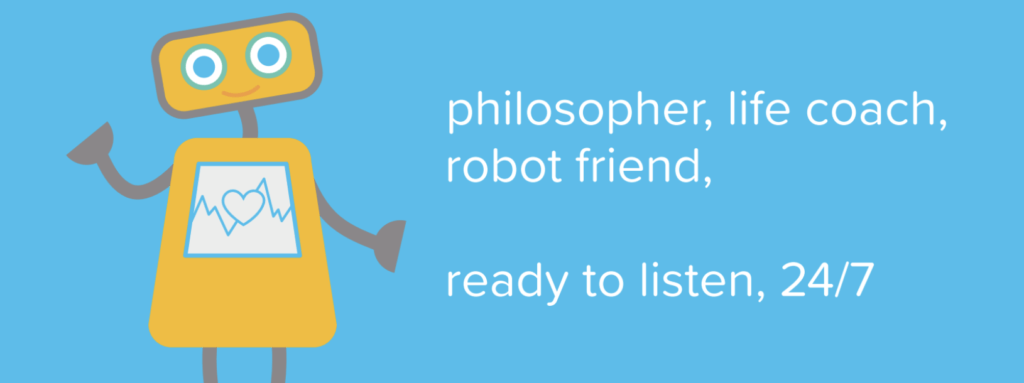Woebot – Bringing mental health care to your finger tips

Woebot is an artificial intelligence chatbot that provides basic mental health care relief at all times, using principles of cognitive behavioral therapy.
The number of people suffering from mental illness is on the rise globally. In the US, nearly 20% of American adults suffer from depression, many of whom will never seek mental health care due to lack of resources, lack of trained health care providers, or the social stigma associated with mental illness. The need for immediate care in response to the rise in mental health cases has not been met through traditional methods, and the mental health care industry is ripe for disruption.
Enter Woebot – an AI chatbot that provides customers with someone to talk to any time of day without delay. By combining artificial intelligence and mental health care, Woebot is able to reach many more people that are suffering and provide actionable items to help them stay on the right path. Woebot provides daily notifications to check-in with its customers, giving them the sense that they are cared and thought about, all the while protecting their anonymity.
While still at the beginning of its development, Woebot utilizes cognitive behavioral therapy (CBT) to provide support to those suffering from anxiety or depression. Alison Darcy, creator of the app and clinical psychologist from Stanford, saw potential in pairing AI with CBT, an effective type of psychotherapy that focuses on turning unhelpful cognitive distortions or behaviors into manageable facts which are easier to solve and cope with.
While the app has seen initial success, Woebot faces challenges to be expected when dealing with telemedicine, such as how to make a robot empathetic, how to customize the experience for users based on their profiles, and how to protect patients’ privacy. While these challenges are substantial, they are in no way limited to Woebot. Other startups in the AI mental health industry face similar hurdles, and as their numbers grow, the technology to support them will as well.
In the future, I believe AI and mental health care can go hand-in-hand. For mild cases of anxiety, depression, or simply loneliness, Woebot offers users a convient, anonymous, and inexpensive way to seek help. For more acute cases of mental illness, Woebot is a great companion to have in addition to more traditional sources of mental health care such as a therapist, psychiatrist, or medication.
While CBT lends itself particularly well to chatbots since it focuses on the present, the industry will eventually move into a direction where talk therapy concerning historical events can be digitalized. With more people suffering from mental illness than available medical health providers, the disruption of AI in the mental health care industry is truly providing value to an underserved population of silent sufferers.
Sources:
- https://time.com/5727535/artificial-intelligence-psychiatry/
- https://www.forbes.com/sites/bernardmarr/2019/05/03/the-incredible-ways-artificial-intelligence-is-now-used-in-mental-health/#26448bc5d02e
- https://hbr.org/2018/10/ais-potential-to-diagnose-and-treat-mental-illness
- https://www.who.int/news-room/fact-sheets/detail/depression
- https://www.businessinsider.com/therapy-chatbot-depression-app-what-its-like-woebot-2018-1#still-darcy-is-emphatic-that-woebot-is-not-a-replacement-for-traditional-therapy-and-that-means-it-may-fall-short-for-some-people-8
- https://woebot.io/how-it-works
- https://www.washingtonpost.com/news/to-your-health/wp/2017/12/03/the-woebot-will-see-you-now-the-rise-of-chatbot-therapy/




I appreciate this so much. Mental health care practitioners are few and far between, especially providers of color. So- having a space like this might really help with some foundational care work. You could even link this to therapist recommendations and the broader telehealth ecosystem. How does the founder and team think about liability and malpractice lawsuits though?
I was talking to a professor earlier today who mentioned that there will be a large rise in mental-health-related challenges due to COVID-19. I wonder if they’re doing anything special to deal with the epidemic and if more people will use services like this in the future.
One of the things I think Woebot does really well with marketing is that they’re clear that they’re selling a robot that’s specifically *not* supposed to be like a human. I think that adds a lot to their value capture.
I agree that by specifically stating that they are a robot, they are managing expectations and offering the customer something foreign and new.
As for the rise in mental-health issues, I recently sat in on a Zoom talk from a mental health specialist saying that these are indeed very tough times. Those suffering from anxiety or depression prior to COVID have felt the severity increasing, while those who were once mentally fit seem to be sliding into anxiety. Hopefully this will revert once the pandemic is over.
Thanks so much for this, Jane Doe! I haven’t tried Woebot yet but would like to, and actually wrote about it as well – great choice 🙂 One thought I had is that I’m wondering whether the app is getting traction enough to be able to charge for it (as they’ve done in the past)… Or at least whether it will in the future. I know there are a lot of people who feel silly chatting about their emotions with a bot, which as you said obviously isn’t empathetic, even if they’re working on improving that aspect. I said I think they should move to a younger target group who may be more receptive to bots’ roles, but I’m wondering now whether there are other options that can make the app more attractive to our generation and older? I’m all for therapy apps, but even I probably wouldn’t use it. I suspect a lot of people our age and above choose mood-tracking journal and mindfulness apps before chatbots. But perhaps I’m wrong. Would be interesting to hear your thoughts.